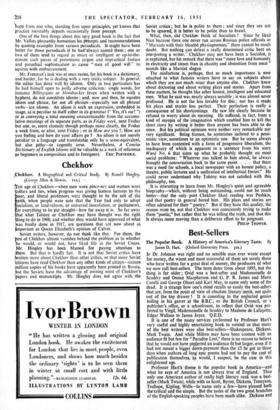Chekhov
,Chekhov. A Biographical and Critical Study. By Ronald Hingley. (George Allen & Unwin. 2 is.) ,Chekhov. A Biographical and Critical Study. By Ronald Hingley. (George Allen & Unwin. 2 is.) age of Chekhov—when men wore pince-nez and women wore ollars and ties, when progress was giving lantern lectures to the oor, and liberal professors were thought to be the salt of the rth, when people were sure that the Tsar had only to adopt ialism, or land-reform, or universal inoculation, or parliaments, or everything to be put straight—how far away it is. So far away hat what Tolstoy or Chekhov may have thought was the right ,thing to do in 1900, and whether they would have approved of what was finally done in 1917, are questions that are now about as Important as Queen Elizabeth's opinion of Calvin.
Soviet writers, however, do not think like this. For them, the rest of Chekhov almost vanishes behind the problem as to whether he would, or would not, have liked life in the Soviet Union. Mr. Hingley has been blamed for paying attention to them. But that is hardly fair. It is not that Soviet critics have Written more about Chekhov than other critics, or that more Soviet citizens have read Chekhov than any other kinds of citizen—sixteen Pillion copies of his books have apparently been printed in Russia, but the Soviets have the advantage of owning most of Chekhov's papers and manuscripts. Mr. Hingley does not agree with the Soviet critics ; but he is polite to them ; and since they are not to be ignored, it is better tcr be polite than to brawl.
What, then, did Chekhov think of Socialists ? Since he liked Nice because there one never ran across Russian police officials or "Marxists with their bloated physiognomies," there cannot be much doubt. But nothing can defeat a really determined critic bent on interpreting a writer.— Chekhov may not have been a Socialist, it is explained, but his remark that there was " more love and humanity in electricity and steam than in chastity and abstention from meat" sounds like a Marxist slogan.
The misfortune is, perhaps, that so much importance is now attached to what famous writers have to say on subjects about which they are not much wiser than anyone else. Chekhov knew about doctoring and about writing plays and stories Apart from these matters, he thought like other honest, intelligent and educated men. What he said was nearly always sensible ; it was almost never profound. He is not the less lovable for this ; nor has it made his plays and stories less perfect. Their perfection is really a consequence of his shortcomings. He saw life clearly because he refused to worry about its meaning. He suffered, in fact, from a kind of myopia of the imagination which enabled him to kill the short story by writing it better than anyone has been able to do since. But his political opinions were neither very remarkable nor very significant. Being human, he sometimes inclined to a pessi- mistic view, sometimes to an optimistic one. But he seems always to have been contented with a form of progressive liberalism, the inadequacy of which is apparent in a sentence from his story Ward No. 6 that sums up what he probably thought on most social problems: "Whatever you talked to him about, he always brought the conversation back to the same point . . . that there was a need for schools, a local newspaper with an honest policy, a theatre, public lectures and a unification of intellectual forces." He could never understand why Tolstoy was not satisfied with this philosophy, too.
It is interesting to learn from Mr. Hingley's quiet and agreeable biography—which, without being outstanding, could not be much better—that the only poet Chekhov liked reading was Pushkin, and that poetry in general bored him. His plays and stories are often admired for their " poetry." But if they have this quality, the reason must be, not that Chekhov was consciously trying to make them "poetic," but rather that he was telling the truth, and that this is always more moving than a deliberate effort to be poignant.
PHILIP TROWER.


































 Previous page
Previous page